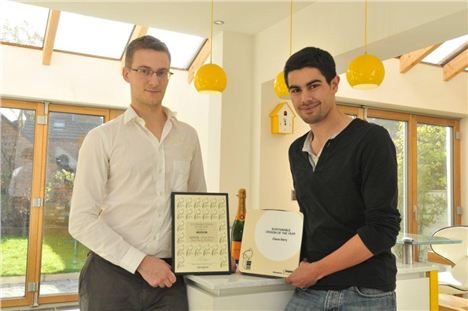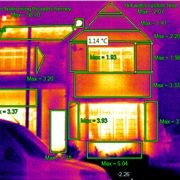KIT Knowles is trying to make us all more conscious of the amount of energy we waste and he seems prepared to do it one house at a time.
In an area like Chorltonville it is important to keep the heritage and we do not want to lose the character for the sake of cutting bills.
He has just spent the last two months interviewing 36 of his neighbours around Chorltonville in a detailed survey of their energy use and lifestyle and more importantly their willingness to change to use less resources.
It’s a project backed by £50,000 of Government funding from its Low Energy Assessment Fund (LEAF) and one of 80 such LEAF projects around the UK.
Knowles said: “We bid for the grant just before Christmas and have the backing of the Manchester based charity Action For Sustainable Living.
“Our idea was to target this very specific area of Chorltonville where the houses were all built 100 years ago but the range of occupants are very diverse.
“We sent out leaflets to every house asking for volunteers to take part and then basically offered each a personal consultation on how they can save energy.”
It starts with the always shocking thermal image, usually glowing bright red and orange to pinpoint exactly where the expensive heat is escaping and how much. Then there are tests for moisture followed by a fairly lengthy lifestyle interview.
The end result is a 40-50 page scientific report detailing the changes they could make both structurally and habitually to save energy and they are given an energy monitor so they can see when their usage goes into the red.
Kit said: “This is where our project is different because you can give people all the carbon information you want but unless you understand people’s lifestyle you cannot help them change.
“It has been calculated that the energy requirements of a household can fluctuate by 10 -30% dependent upon the behaviours of the inhabitants. This is a very significant factor when it comes to reducing one’s carbon footprint. “
Not surprisingly in this eclectic conservation area his research has thrown up some contrasts from the family that spends £4,300 a year on gas and electric without batting an eyelid to the practical hippy who is happy to wear half a dozen jumpers when the weather turns nippy.
Knowles said: “For the family spending a lot on fuel, money is not an issue so reducing use to cut the bills would not be a driving factor.
“They have lots of gadgets, like fresh air so even on the iciest of days the windows are open and the heating blasting out. They don’t really want to change that.
“Instead we are looking at installing a bio-mass boiler to allow them to create their own heat and hot water and that came about following the interview. They like the idea of creating their own power.”
“A lot of the energy saving measures in the UK are currently pitched at terraced houses and 1930s semis because they make up the bulk of the country’s housing stock. But many of the people living in those types of property are often much more money conscious and are careful about energy use for financial as well as environmental reasons.
“People in large properties may not have the same restrictions so it is here that lifestyle changes play a much greater part and can therefore make a much bigger contribution to saving energy.
“It’s about the scale of use and the scale of possible savings.”
His own home, a semi on The Thorns, is a show case for all his eco-knowledge and a working showcase for his company Ecospheric which calculates bespoke solutions to help cut property energy consumption. His house is so efficient it has been classed as a Superhome by the Sustainable Energy Academy and he regularly holds open days to show what can be done.
Bought as a wreck the solid outer walls are now covered in thick insulated render, the windows are triple glazed, and a hybrid heat exchange system brings in fresh air and expels the old retaining the heat as it goes.
There is also a new extension at the back, built in timber and super insulated and the shiny white and yellow kitchen won the Best Sustainable award in a recent competition.
And it’s gorgeous, full of energy efficient products made by Siemens. It proves you don’t have to live in hair shirt conditions to reduce your carbon footprint.
In an ideal world Knowles would like everyone in Chorltonville to follow his example – it could be the first passive house estate in the UK. A green utopia.
But it’s unlikely to happen.
He said: “In general people have been very receptive to the ideas and suggestions we have made to help them reduce their energy consumption and a lot of people have promised to make a lot of changes.
“And small changes can make a big difference and can lead to bigger changes.
“In an area like Chorltonville it is important to keep the heritage and we do not want to lose the character for the sake of cutting bills. But I think my house shows you can have both. The front door is still original and single glazed and quite draughty but the inner door is the one that seals the house and keeps in the heat.”
There are many ways in which a person can effect the energy consumption of a dwelling.
 Kit Knowles, left and Jonny Allen with their Sustainable Kitchen award
Kit Knowles, left and Jonny Allen with their Sustainable Kitchen award
It has been calculated that the energy requirements of a household can fluctuate by 10 -30% dependant upon the behaviours of the inhabitants. This is a very significant factor when it comes to reducing one’s carbon footprint. This section will discuss a few ways in which house owners and their inhabitants can make changes to their life-styles and break wasteful habits.
All Knowles results and findings will be fed back to the LEAF fund and will help set environmental policy and energy efficiency in the future.
But he is still four properties short of his 40 house target so if you live in Chorltonville and want a free detailed energy survey (something that Kit would normally be charging around £600 for) drop him a line at kit.knowles@googlemail.com.
 Loss and gainA startling snippet related to lifestyle is that 60% of the energy consumed by our homes is used by our heating systems. Over half the homes in the UK have their thermostats set above 21°C and if you turn the thermostat down by one degree you would save 10% on your gas bill.
Loss and gainA startling snippet related to lifestyle is that 60% of the energy consumed by our homes is used by our heating systems. Over half the homes in the UK have their thermostats set above 21°C and if you turn the thermostat down by one degree you would save 10% on your gas bill.
Another important consideration when reducing behavioural consumption is to remove peripheral devices such as bar/fan heaters. These stand alone devices are always deeply inefficient. Not only does the electricity used to run them cost four times as much when compared to gas, but environmentally speaking electricity should always be avoided as a source of heat.
This is due to the fact that if the coal/oil/gas had 100 units of energy before being used in a power station, only 22 units of energy are actually delivered into your home.










